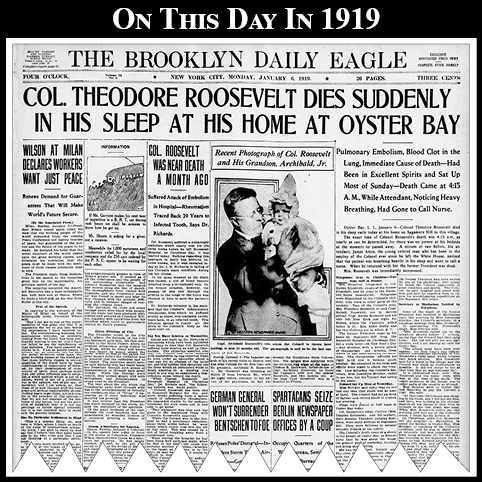January 6: ON THIS DAY in 1919, Roosevelt dies suddenly in his sleep

ON THIS DAY IN 1919, the Brooklyn Daily Eagle reported, “Oyster Bay, L.I. — Colonel Theodore Roosevelt died in his sleep early today at his home on Sagamore Hill in this village. The exact time of Colonel Roosevelt’s death was 4:15 a.m., as nearly as can be determined, for there was no person at his bedside at the moment he passed away. A minute or two before, his attendant, James Amos, the young colored man who has been in the employ of the Colonel ever since he left the White House, noticed that the patient was breathing heavily in his sleep and went to call a nurse. When he returned with her, the former President was dead. Mrs. Roosevelt was immediately summoned … The former President came to his home on Sagamore Hill from the Roosevelt Hospital on Christmas Day, but a week later — on New Year’s Day — was stricken with a severe attack of rheumatism and sciatica, from which he had been suffering for some time … Flags were placed at half-mast in Oyster Bay today … The Colonel’s death came as a shock to the people of Oyster Bay, as friends knew that he was about the house the greater part of yesterday, reading and doing some writing. His two sons abroad, Kermit and Theodore, Jr., are, respectively, officers with the American Forces in France and the Army of the Occupation in Germany.”
***
ON THIS DAY IN 1920, the Eagle reported, “Boston — The passing of ‘Babe’ Ruth, slugger extraordinaire and pitcher of high degree, from the Boston Red Sox to the New York Americans for the largest sum ever paid for any baseball player, was due to Ruth’s ego, President Harry H. Frazee said today. ‘I sold Ruth for the best interests of the Boston club,’ he explained. ‘The Babe was not an influence for good, or for team play. He thought only of himself.’ The Red Sox president said he felt the team as it stood today without Ruth and with certain prospective additions would be 25 percent stronger. Two deals are pending, he added, both having as their object an outfielder to take the place Ruth filled.”

Brooklyn Boro
View MoreNew York City’s most populous borough, Brooklyn, is home to nearly 2.6 million residents. If Brooklyn were an independent city it would be the fourth largest city in the United States. While Brooklyn has become the epitome of ‘cool and hip’ in recent years, for those that were born here, raised families here and improved communities over the years, Brooklyn has never been ‘uncool’.